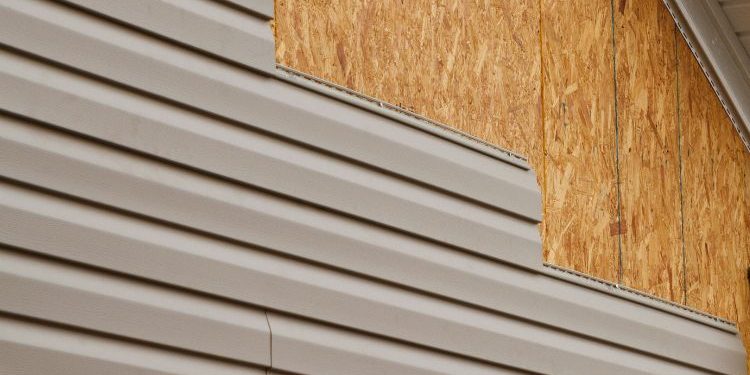Your home’s siding is a key player in both protecting your property and contributing to its curb appeal. As the seasons change in Allen, TX, the weather can take a toll on your siding, leading to potential damage that can affect your home’s overall structure. Knowing the warning signs of siding damage is essential to ensure that your home stays safe and visually appealing. If you’ve noticed any of these signs, it may be time to reach out for professional siding repair services in Allen.
Key Takeaway: Pay close attention to signs of siding damage, as neglecting repairs can lead to further structural issues and higher costs in the future.
Understanding Siding Damage: Common Warning Signs
When it comes to siding, the first step in preventing extensive damage is understanding what to look for. Here are some of the most common signs that your siding may need attention:
- Cracks and Gaps: Small cracks or gaps in your siding can develop over time due to weather exposure or settling of your home’s foundation. Even minor cracks can allow moisture to seep in, leading to more significant damage. Inspect your siding regularly for any cracks or gaps that could compromise the integrity of your home.
- Warping or Bubbling: Warping and bubbling in the siding are often signs that water has gotten underneath the material, causing it to swell. This can be due to a leak or the natural expansion and contraction of the siding as it absorbs moisture. Warped or bubbled siding may not only look unattractive but can also cause further water damage to your home.
- Peeling Paint or Staining: If your siding is painted, peeling paint can indicate that moisture is trapped beneath the surface. Similarly, staining or discoloration could signal that mold or mildew is growing due to excess moisture. This is especially common in areas that experience high humidity or rainfall, such as Allen, TX.
The Impact of Weather on Siding
Allen, TX, is no stranger to varying weather patterns, from the blistering summer heat to occasional winter freezes. Extreme weather can take a toll on your siding. Here’s how different types of weather affect your home’s exterior:
- Heat and Sun Exposure: Intense heat can cause certain types of siding, like vinyl, to fade or crack. The sun can also cause the siding to expand and contract, which over time can lead to warping and splitting. Keeping an eye on how your siding reacts to the weather can help you spot issues before they worsen.
- Heavy Rain and Flooding: Excessive rainfall can lead to water damage on your siding. Siding is designed to protect your home from moisture, but over time, the sealant can wear away, allowing water to seep behind the siding. In Allen, where summer thunderstorms are frequent, it’s important to monitor your siding for signs of moisture infiltration.
- Winter Freezes: While Texas may not experience harsh winters, freezing temperatures can still occur. When water gets trapped behind siding and freezes, it can expand, causing the siding to crack or buckle. This is particularly common with wood and fiber-cement siding.
Common Siding Materials and Their Durability
Different types of siding materials have unique characteristics and durability. Here’s a look at some of the most common siding materials and how they react to damage:
- Vinyl Siding: Vinyl is one of the most popular siding options due to its affordability and low maintenance. However, it can become brittle over time, especially if exposed to excessive sunlight or cold temperatures. Cracks and dents are common signs that vinyl siding needs repair.
- Wood Siding: While wood siding adds charm to a home, it requires more maintenance compared to vinyl. Over time, wood can rot, warp, or split due to moisture exposure. Regular painting and sealing can help extend the life of wood siding, but if it’s been neglected, repairs may be necessary.
- Fiber-Cement Siding: Known for its durability, fiber-cement siding can still experience wear and tear over time. Although resistant to many weather conditions, it can still develop cracks or signs of moisture infiltration, especially around the seams.
Why Timely Siding Repairs Matter
When it comes to your home, siding repair is not just about aesthetics. Ignoring damaged siding can lead to much larger issues. Here’s why timely siding repair is essential:
- Prevent Water Damage: Damaged siding can allow water to infiltrate the walls of your home, leading to mold, mildew, and structural damage. Timely repairs can help prevent costly water damage and keep your home safe from moisture-related issues.
- Energy Efficiency: Your siding plays a role in your home’s energy efficiency. Damaged siding can result in air leaks, which makes it harder to keep your home cool during hot Texas summers or warm in the winter. Repairing your siding can help improve your home’s insulation and save on energy bills.
- Curb Appeal: The exterior of your home is the first thing visitors or potential buyers see. Damaged siding can significantly reduce your home’s curb appeal. By repairing your siding, you can restore your home’s beauty and maintain its value.
How to Maintain and Prevent Siding Damage
Routine maintenance is key to preventing extensive siding damage. Here are some tips to keep your siding in top shape:
- Clean Your Siding Regularly: Dirt and debris can accumulate on your siding, leading to staining or water damage. Regular cleaning can prevent buildup and keep your siding looking new. Use a soft-bristle brush and gentle cleaning solution to remove dirt and algae.
- Inspect Your Siding: Regularly inspect your siding for any signs of damage. Look for cracks, gaps, or signs of moisture. Early detection of issues allows for timely repairs before the damage spreads.
- Seal Your Siding: Sealing your siding, especially wood siding, is essential to prevent moisture from seeping in. Regularly applying a fresh coat of sealant can extend the life of your siding and protect your home from the elements.
Answering Common Questions
What is the cost of siding repair in Allen, TX?
Siding repair costs can vary depending on the material, the extent of the damage, and the type of siding you have. For a more accurate estimate, it’s best to contact a local professional who can assess the condition of your siding.
Can I repair my siding myself?
While minor siding repairs may be DIY-friendly, it’s often best to hire a professional to ensure that repairs are done correctly. Professional siding contractors have the experience and tools needed to fix your siding properly, preventing further damage.
How often should I inspect my siding?
It’s recommended to inspect your siding at least twice a year, particularly after extreme weather conditions. Keeping an eye on your siding’s condition can help catch issues early and prevent more costly repairs later.
Why Professional Help is Essential
If you’ve noticed any of these warning signs, it’s crucial to reach out to a professional siding repair contractor. Hiring an expert ensures that your siding repairs are done safely and effectively, protecting your home for years to come. At Pristine Roofing & Outdoor Services, we offer high-quality siding repair services to homeowners in Allen, TX. Whether you need vinyl siding repair or assistance with more extensive damage, our team is here to help.
For more information or to schedule a consultation, contact us today! Protect your home with the expert care it deserves.







